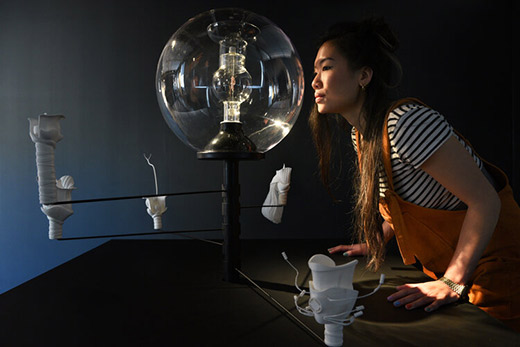Science Gallery Atlanta at Emory University will explore the twin themes of addiction and recovery in its inaugural exhibition, topics of particular relevance as mental health concerns climb because of the pandemic.
The exhibition titled “Hooked,” is made possible by a $126,500 grant from Science Sandbox, an initiative of the Simons Foundation. Science Gallery Atlanta will launch the exhibition in early 2022. It also plans to organize some smaller events on the same theme in the run-up to the opening.
Emory joined the Science Gallery Network earlier this year as its eighth member. The global university-led collaborative is dedicated to public engagement with science and art with a focus on reaching young people between 15 and 25 years of age.
“Hooked” will feature immersive experiences using a mix of curated pieces from the Science Gallery exhibition in London and specially commissioned projects by Emory faculty, students and Atlanta artists who will collaborate to create interactive artworks for the exhibition.
To that end, Science Gallery Atlanta is now inviting creative minds from the sciences and arts to contribute proposals for “Hooked.” Proposals can be a new or existing artwork, performance, workshop, digital intervention, research project or other activity. Interested participants can visit the Science Gallery Atlanta Open Call site to learn more.
“I am delighted that Science Gallery Atlanta will be open to our community,” says Emory President Gregory L. Fenves. “This dynamic space for and by young people, focused on science, has never been more relevant. As an example, when we launch Science Gallery one of the themes will be addiction, and it will draw upon the arts and sciences to educate and enlighten about this critical problem facing so many families.”
Young people, apart from being the primary audience, play a key role in the ideation of themes and displays at these galleries; they are also recruited as mediator docents responsible for explaining exhibits and the underlying science to visitors.
Deborah Bruner, senior vice president of research at Emory, says the university’s entry into Science Gallery offers a new dimension to the collaborative.
“Emory is leading the development of a research consortium to facilitate, coordinate and support research and scholarship through our learnings from Science Gallery,” Bruner says. “The knowledge created at the intersection of academic disciplines and youth engagement will undoubtedly advance our understanding of how creativity and discovery are ignited where science and art collide.”
“Hooked” will offer audiences a multi-dimensional, nuanced understanding of the challenges associated with a variety of common addictions, from drugs to use of social media, and the many roads to recovery. It will also examine addiction as a fundamental risk of being human in a world where drugs are criminalized and social media and other digital platforms can trigger unhealthy dependencies.
John Tracey, Science Sandbox’s program and media officer, says the Science Gallery model is “a powerful way to bring meaningful experiences with science to everyone. We couldn’t be more thrilled to support this initiative for the people of Atlanta."
Part experiment, part exhibition, Science Gallery is a living laboratory for ideas. Its programs connect, engage and showcase the work of artists, scientists, researchers, industry and a global network of collaborators. Some Science Galleries are housed in permanent spaces while others curate pop-ups exhibitions and traveling exhibits.
About The Science Gallery Network
The Science Gallery Network consists of leading universities united around a singular mission: to ignite creativity and discovery where science and art collide. Science Gallery International is the non-profit, charitable organization catalyzing the growth of the network, providing services, tools and resources required to power and expand this unique global collaboration, which now has eight members across four continents: the pioneering member Trinity College Dublin (Ireland); King's College London (The United Kingdom); The University of Melbourne (Australia); the Indian Institute of Science, Srishti School of Art Design and Technology, The National Centre for Biological Sciences (India); Ca' Foscari University of Venice (Italy); Michigan State University (United States); Erasmus University Medical Center (The Netherlands); and Emory University (United States).

